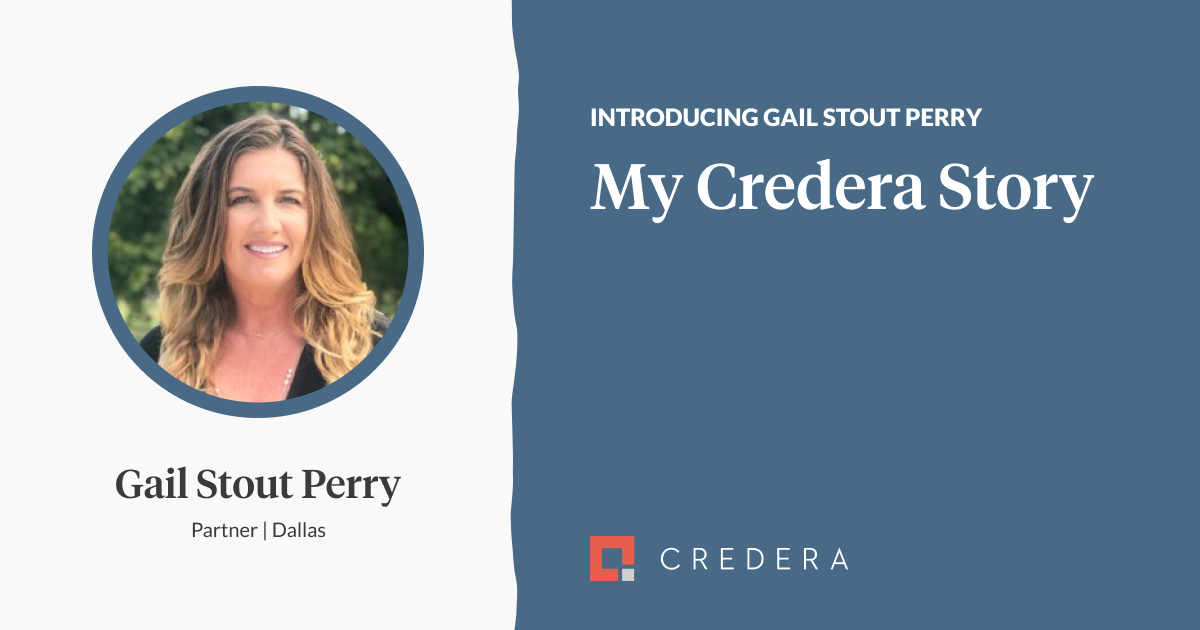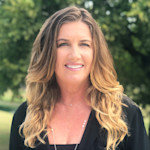
Everyone has a story. A story that has been influenced by experiences, communities, and people. Our stories shape who we are and who we are becoming. We want to celebrate all of the unique stories and different experiences that have shaped our people and build the fabric of our firm. With that in mind, we’re excited to introduce you to leaders across all levels at Credera and their unique stories and perspectives through a blog series called, My Credera Story.
This week you’ll get to know Gail Stout Perry, a Partner in Credera’s Dallas office.
Gail’s Story
I grew up with a stay-at-home mom. So when I had a daughter of my own, I thought I’d want to give her the same experience my mother gave me. But when Katherine was about four years old, I chose to transition back to the working world. In all honesty, I was actually relieved to get back to work. Not that I didn’t love my role as a mother, but I needed the mental stimulation, challenge, and financial security that came through a career. It wasn’t easy at first—the tearful “you don’t love me” cries from my daughter still stab my heart. And looking back, I know I must have hurt her many times as I strove to achieve career success while also feeling a pressure to hide my role as “mother” from the working world—a difficult feat since for most of the time I was a single, sole-custody mom.
Recently, I sat down with my now adult (very career-oriented) daughter, who happens to be my best friend, to discuss my worries. I asked her about how my decision to be a working mom affected her and what her perspective on that choice is now. Her answers not only surprised me, but I believe her insights will encourage other working parents who have similar fears to the ones I had 20 years ago. Here is a bit of our conversation:
Gail: Before it was a “thing,” I managed to put together a career that allowed me to work from home unless I was traveling to a client. This means you didn’t go to childcare while I went to an office. But it was just the two of us and my work and home life were integrated 24/7. “Shh, Mommy’s working,” was a mantra in our house. How did this work-from-home situation impact you?
Katherine: At first, I didn’t understand and thought you were ignoring me. But over time I got used to it. And it definitely had its benefits. For example, if I needed you, I didn’t have to call your secretary or wait for you to get home, I could just talk to you (granted, I did have to wait until you were off the phone).
I didn’t realize this at the time, but I also got to witness your work ethic, which has benefited me tremendously. I got to see the good, the bad, and the ugly. I learned that every job comes with hard times. I also learned how to handle those setbacks and rough patches and when to stay the course versus when to look for new opportunities.
Gail: As you know, I worked almost every evening and weekend. Often, I was doing extra work that gave me joy, such as researching to hone my knowledge, creating thought pieces to build my personal brand, writing a book, and working on things to improve and grow the business. How did you view this additional work on things that I loved?
Katherine: Once I started working, I realized that you had chosen a career that wasn’t just a job, it was your passion, and you wanted to go above and beyond because you genuinely enjoyed it. This understanding influenced my own career choice. After graduating college, I began a career path that I didn’t have a passion for, so I left to attend graduate school in pursuit of a career I really am passionate about.
You love your career. It was your other child. I got to see that love firsthand. I learned that it’s OK for your career to be your baby. Your career doesn’t have to be a 9-to-5 job that you hate like what’s portrayed on TV. Now my career is my baby, and I know that it’s OK to feel this way. I know that loving my career and wanting to spend every free minute working on it is a good thing — it means I’ve chosen well.
Gail: When I traveled for work — which was sometimes more than 50% — I left you with a cadre of caregivers, drivers, etc. And while away, I parented you via mobile phone (by the time you were about 13, though, I’d figured out how to integrate you into some of my client travels — especially the international engagements). From my perspective, I was usually stressed when I was away and trying to orchestrate your care. I worried about you and panicked if my phone was ever out of reach. What was your experience when I traveled?
Katherine: I missed you, but I had seen you in front of clients before and I knew how much joy it brought you, so I was happy for you every time you left. I never really stressed much when you were gone because everything was so well-coordinated. And then eventually, getting to travel with you was a huge plus! I had so many amazing experiences that many of my friends have never had and will likely never have.
Another benefit was getting to see what non-9-to-5 work life looks like. I watched you leave in the middle of the day to take me to the doctor then work late or work over the weekend to make up for it. You were working from home and on this kind of schedule long before it became commonplace. Watching you learn how to handle it prepared me for the working world. I learned how to balance work while always staying connected with the important people and personal obligations in my life.
Gail: What negative consequences did you experience? What would you have changed?
Katherine: I wouldn’t have changed a thing. I would not have given you this answer as a child, but in hindsight I would not change a thing. I guess it’s just something you don’t understand and appreciate until you are an adult.

Gail: If you turn the clock back, knowing what you know now, what advice or encouragement would you give your 4-year-old self and your mom?
Katherine: I don’t think there is anything I could have said to help my “child self” to understand. It’s something you won’t understand as a kid, but that’s OK. For Mom, I would say that although the “you don’t love me” and other cries are heartbreaking, stay the course. In 20 years, your child will be grateful for it.
Reflecting Back
What I know now (that I questioned 20 years ago) is that every family is unique, and every mother has different needs. My desire to be a working mom, both excellent as a mother and excellent in my career, was what I needed—and it was possible. And even though I had a demanding career, I was able to raise a strong, mature young woman who learned valuable lessons from this lifestyle at the same time.
Working at Credera
At Credera, we have a culture that values all unique perspectives, backgrounds, and histories that our employees represent. If you’re interested in a career at Credera and navigating this journey, please visit our careers page.
Contact Us
Ready to achieve your vision? We're here to help.
We'd love to start a conversation. Fill out the form and we'll connect you with the right person.
Searching for a new career?
View job openings